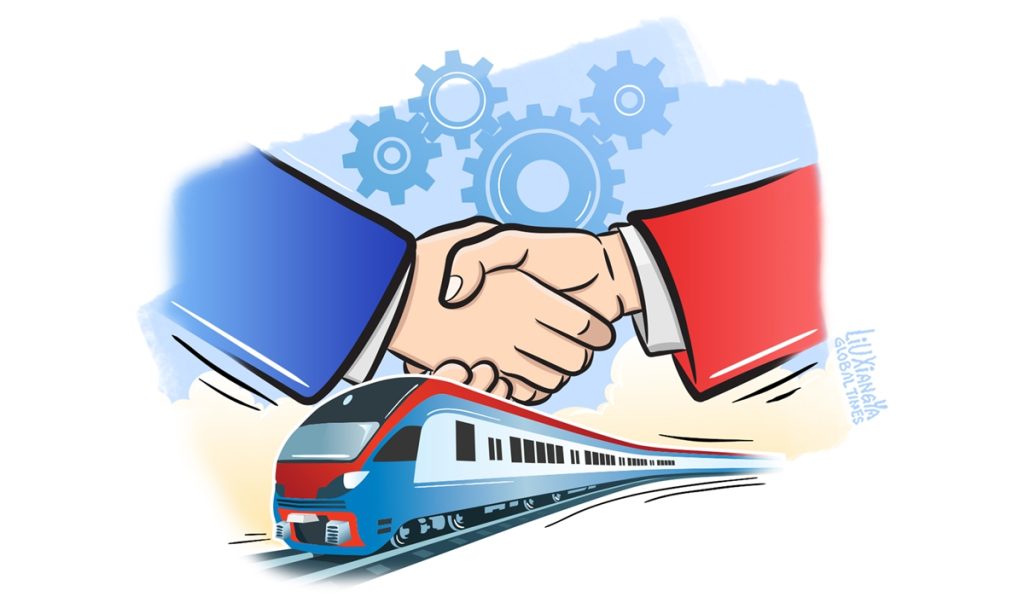Hungary-Serbia railway could inspire divided world as protectionism rises

The construction of the Hungary-Serbia railway, a flagship project of the China-proposed Belt and Road initiative (BRI), will help inject new impetus into the economies of the two countries. The railway, plus the China-Serbia Free Trade Agreement (FTA) signed in 2023, may provide people with a new perspective on the increasingly fragmented global trade situation.
As reported by the Xinhua News Agency on Sunday, Serbia's Minister of Construction, Transport and Infrastructure Goran Vesic said that Serbia's participation in the BRI has boosted the overall development of the country and its neighbors. He cited the construction of the Hungary-Serbia railway as an example of successful BRI cooperation.
The Hungary-Serbia railway is a double-track electrified railway with a total length of 341.7 kilometers, including 183.1 kilometers in Serbia. Sitting at the crossroads of Central and Southern Europe - and often seen as a geographical region that straddles both Eastern and Western Europe - Serbia has unique geographical advantages. The construction of the railway is expected to improve connectivity between Hungary and Serbia and help clear barriers from Serbia to Greece's Piraeus Port, a transit hub connecting Europe, Asia and Africa.
The Hungary-Serbia railway is considered an important project to improve physical connectivity, as part of multifaceted cooperation aimed at deepening economic exchanges.
Connectivity includes not only physical infrastructure like roads and railways but also institutional arrangements to make it easier to strengthen exchanges among different regions.
China and Serbia signed an FTA in October 2023. The signing of the FTA and subsequent tariff cuts have enhanced trade relations, boosted Serbia's exports and - more importantly - served as a bridge to open up new trade routes and ramp up trade and investment between China and Europe.
Trade between China and Europe reached $1.215 trillion in 2023. Both sides have strong trade complementarity, and unleashing this potential can generate more positive influences on Europe's economy, helping solve problems it faces, such as stubborn inflation.
The lingering question is how to unleash this huge potential. There are two critical factors. On the one hand, we should continue to promote infrastructure interconnectivity; on the other hand, we should take concrete actions to reject all forms of protectionism and unequivocally advocate for and support free trade.
Facing a complex and volatile international situation, China and Serbia, acting as each other's "ironclad friends," have continuously enhanced cooperation in multiple fields such as railway infrastructure construction and free trade. These factors interact with one another, forming a joint force to boost economic cooperation.
The nature of cooperation is mutually beneficial, and that's why the Serbian side holds a positive attitude toward cooperation with China. Vesic said Serbia is proud of its participation in the BRI, under which Chinese companies have undertaken many infrastructure projects in the country.
The construction of the Hungary-Serbia railway reached a milestone on April 25, when the track-laying work for a 108-kilometer section between Novi Sad and Subotica in Serbia was completed. It's not always easy to undertake large-scale infrastructure projects, and the construction of the Hungary-Serbia railway faces some challenges, but the project has been steadily advancing. That's because this is good for the Serbian economy, which could benefit greatly from infrastructure projects.
Amid global economic uncertainty, various countries, including those in Europe, are trying to gain new growth momentum as traditional drivers weaken. What is needed today is to improve economic connectivity and further promote free trade. As long as cooperation can bring tangible economic benefits to local economies, it will eventually overcome temporary challenges and difficulties.
The US-advocated "decoupling" and Washington's geopolitical games have brought enormous challenges to global trade, but globalization and free trade are the only ways to promote mutually beneficial cooperation. Politicians with a sober mind will not politicize economic issues and not fall into the "decoupling from China" trap.